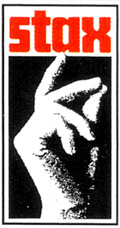Â

Stax Records logo

Al Bell
By Brandon I. Brooks
Sentinel Entertainment Editor
Al Bell is a music pioneer if there ever was one. Â With over 50 years of music industry experience, Bell has been breaking down cultural barriers for decades. Â Musical success is nothing new for a man that has left a lifetime imprint on an industry that sees most participants fly by night.
From his humble beginnings as an air personality in Little Rock, Memphis, and Washington, DC, to his position as Chairman of Stax Records and subsequently the president of Motown Records, BellÃs dynamic leadership style led him to become the owner of Stax Records.
According to Black Enterprise magazine, the two largest African American-owned businesses in America in the 1970s were Motown and Stax Records. Al Bell arrived at Stax Records in 1965 with the singular mission of turning around a company that was $90,000 in debt. He delivered on that mission, and within his first nine months at Stax the record company experienced gross revenues of over $1.5 million.
During his years as the head of Stax Records, Al Bell introduced marketing and promotional innovations to a stagnating record industry; those innovations continue to make a recurrent impact on the fabric of our society. Al BellÃs visionary efforts reverberated around the globe, altered attitudes, and changed the direction of the American music industry.
In 1968, following the plane crash that killed Stax’s biggest star, Otis Redding, Stax severed its distribution deal with Atlantic Records, which retained the label’s back catalog to that point. Mr. Bell launched an initiative designed to put out enough albums and singles in an effort to rebuild a catalog for Stax.
Stax produced gold and platinum hits with such varied artists as Isaac Hayes, The Staple Singers, Johnnie Taylor, Sam and Dave, Booker T and the MGÃs, The Bar Kays, Otis Redding, The Emotions, Carla Thomas, Rufus Thomas, Richard Pryor, Bill Cosby, Billy Eckstein, Albert King, The Dramatics, Reverend Jesse Jackson, and a host of others.
By 1974, Price Waterhouse valued StaxÃs post-1968 master tapes at $67 million. A 1975 appraisal of StaxÃs publishing company, East Memphis Music Publishing, had placed its value at $15 million. In 2008 dollars this would equal $265 million and $57 million, respectively.
Stax Records worked with Melvyn Van Peebles on the release of his revolutionary film Sweetback, and again with MGM Studios on the release of the film Shaft. During this time Al Bell demonstrated marketing and promotional techniques that woke the sleeping film industry to the potential of the black marketplace, beginning the black film boom of the 1970s.
Al Bell added to the roster of box office hits with the landmark film Wattstax, The Living Word, a documentary based on a Stax Records concert that entertained 112,000 people in the Los Angeles Stadium. At the time, this was the largest musical event ever presented to black America. With Al Bell as executive producer, Wattstax went on to be a Golden Globe-nominated, Cannes-celebrated, and Sundance Film Festival award-winning movie.
In the 1980s, when Berry Gordy needed a strong leader at Motown, he reached out for Al Bell. Al became head of Motown Records Group and worked with Berry Gordy in the sale of Motown to the MCA/Boston Ventures Group. After Motown, he discovered the music group Tag Team and through his Bellmark Records label released their hit single ìWhoomp! (There It Is)î (1993), which became one of the fastest selling singles in the music industry history. Mr. Bell also released Prince’s hit single “The Most Beautiful Girl In The World”, after Prince’s label Warner Bros. Records turned him down.
After Bellmark Records, Bell returned to Little Rock to begin work on a new web-based venture, Al Bell Presents, where he hosts a successful online radio program, Al Bell Presents: American Soul Music. In 2009, Bell was profiled in the New York Times and on the BBC as he returned to Memphis to help develop the city’s independent music scene.
In a book chronicling the history of Stax, titled Soulsville USA: The Stax Records Story, Rev. Jesse Jackson is quoted on its cover saying, ìStax was not just a record company. It was a sound. It was a piece of culture. It was a moment of conscience and experience of mankind. At the right time, it meant a lot to us. People still heavily borrow upon the tradition of Stax and the lineage laid down by the very special genius of Al Bell.î
For more information visit www.albellpresents.com
Â






